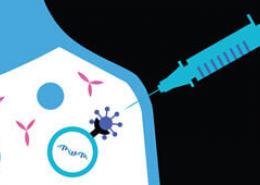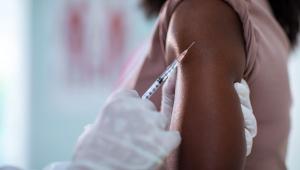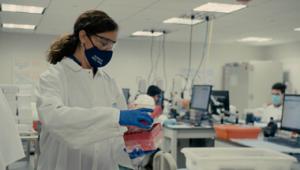MRNA VS. CONVENTIONAL VACCINES

Meet our new Chief Patient Officer, Dr. Dara Richardson-Heron

Working Together to Empower Women

Pfizer Women’s Resource Group

Universal vs. Single Payer Healthcare

Meet Dacia Young, a Senior Associate Scientist within the Vaccine Research and Development Group at Pfizer. Dacia has worked as a Scientist at Pfizer for more than 14 years, leading the assay development for our meningococcal disease vaccines since 2013.
As a scientist working on vaccines in the middle of a pandemic, Dacia understands firsthand the tangible impact vaccines can have on public health. Now she’s discussing why she finds developing vaccines so rewarding, and explaining why she believes vaccines are essential for helping to prevent infectious diseases like meningococcal disease.
What is meningococcal disease?
Meningococcal disease refers to any illness that is caused by a type of bacteria called Neisseria meningitidis. One type of invasive meningococcal disease, meningococcal meningitis, causes inflammation of the protective membranes covering the brain and spinal cord. This infection can impact people at any age. In the United States (U.S.), it is most common among infants, teenagers and young adults. It can be spread from person to person through close contact, such as living in the same household, kissing and coughing. While infection is rare, meningococcal disease can turn deadly in as little as 24 hours, leaving a narrow window of opportunity to deliver life-saving treatment.
How to prevent meningococcal disease?
Standard treatment protocols often do not work fast enough, which is why we need to educate others about the vaccines available to help protect against the five most common serogroups of meningococcal disease – A, B, C, W and Y – which historically cause 96% percent of cases worldwide. In my opinion, when it comes to meningococcal disease, vaccination can be the potential difference between life and death. Knowing that the work I do every day has the potential to impact lives all around the world is incredibly rewarding.
How is meningococcal disease different depending on where you live?
While there are vaccines currently available worldwide to help prevent meningococcal disease, it’s important to understand that disease patterns and risk vary over time and between geographical areas, age groups and bacterial serogroups. That’s what makes my work – and Pfizer’s ongoing investment in R&D – so important to better address disease prevention, emerging clusters and outbreaks worldwide. It’s a continuous job and we always want to improve and work to offer coverage for all strains and serogroups.
Is there currently a vaccine for all types of meningococcal disease?
In addition to the need for greater awareness of meningococcal disease, the current standard of care in the U.S. is to receive two doses of a MenB-specific vaccine and two doses of a conjugate MenACWY vaccine in order to achieve the broadest protection possible. The need for multiple vaccines and multiple doses has long been a barrier to adherence and thus, protection.
This need to improve is a really exciting part of my work right now, which is focused on the development of a vaccine candidate that has the potential to address all five serogroups (A, B, C, W and Y) in one vaccine and fewer doses. Currently, there is no vaccine available like this.
I love the scientific process and I love trying to solve problems. During these unprecedented times that have impacted life for so many, I am continually inspired by my community and motivated by my contributions to science. It is an exciting time to be developing vaccines at Pfizer and I am truly grateful to work for a company that is passionate about creating breakthroughs that change patients’ lives.
Vaccines help to effectively reduce the number of people who fall victim to meningococcal disease.








Source: Read Full Article
